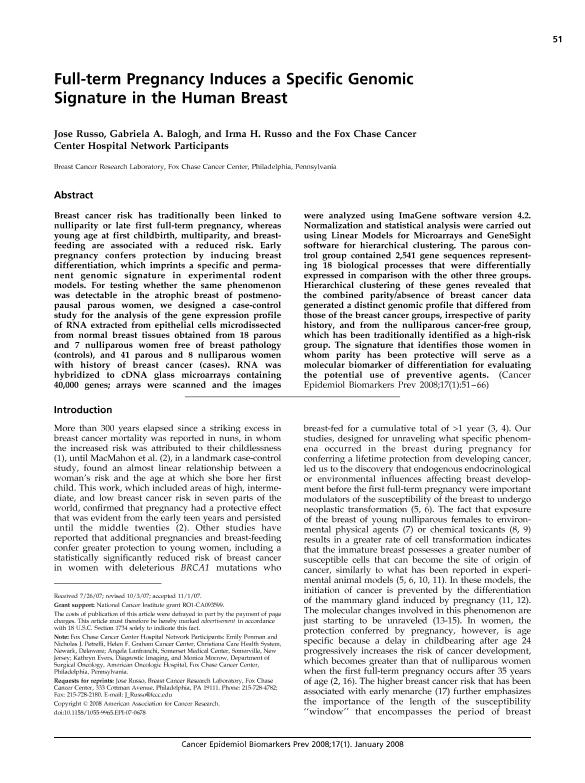Artículo
Full-term pregnancy induces a specific genomic signature in the human breast
Russo, José; Balogh, Gabriela Andrea ; Russo, Irma H.; Fox Chase Cancer Center Hospital Network Participants
; Russo, Irma H.; Fox Chase Cancer Center Hospital Network Participants
 ; Russo, Irma H.; Fox Chase Cancer Center Hospital Network Participants
; Russo, Irma H.; Fox Chase Cancer Center Hospital Network Participants
Fecha de publicación:
16/01/2008
Editorial:
American Association for Cancer Research
Revista:
Cancer Epidemiology, Biomarkers & Prevention
ISSN:
1055-9965
e-ISSN:
1538-7755
Idioma:
Inglés
Tipo de recurso:
Artículo publicado
Clasificación temática:
Resumen
Breast cancer riskhas traditionally been linked to nulliparity or late first full-term pregnancy, whereas young age at first childbirth, multiparity, and breastfeeding are associated with a reduced risk. Early pregnancy confers protection by inducing breast differentiation, which imprints a specific and permanent genomic signature in experimental rodent models. For testing whether the same phenomenon was detectable in the atrophic breast of postmenopausal parous women, we designed a case-control study for the analysis of the gene expression profile of RNA extracted from epithelial cells microdissected from normal breast tissues obtained from 18 parous and 7 nulliparous women free of breast pathology (controls), and 41 parous and 8 nulliparous women with history of breast cancer (cases). RNA was hybridized to cDNA glass microarrays containing 40,000 genes; arrays were scanned and the images were analyzed using ImaGene software version 4.2. Normalization and statistical analysis were carried out using Linear Models for Microarrays and GeneSight software for hierarchical clustering. The parous control group contained 2,541 gene sequences representing 18 biological processes that were differentially expressed in comparison with the other three groups. Hierarchical clustering of these genes revealed that the combined parity/absence of breast cancer data generated a distinct genomic profile that differed from those of the breast cancer groups, irrespective of parity history, and from the nulliparous cancer-free group, which has been traditionally identified as a high-risk group. The signature that identifies those women in whom parity has been protective will serve as a molecular biomarker of differentiation for evaluating the potential use of preventive agents.
Palabras clave:
Breast Cancer
,
Prevention
,
Biomarkers
Archivos asociados
Licencia
Identificadores
Colecciones
Articulos(CERZOS)
Articulos de CENTRO REC.NAT.RENOVABLES DE ZONA SEMIARIDA(I)
Articulos de CENTRO REC.NAT.RENOVABLES DE ZONA SEMIARIDA(I)
Citación
Russo, José; Balogh, Gabriela Andrea; Russo, Irma H.; Fox Chase Cancer Center Hospital Network Participants; Full-term pregnancy induces a specific genomic signature in the human breast; American Association for Cancer Research; Cancer Epidemiology, Biomarkers & Prevention; 17; 1; 16-1-2008; 51-66
Compartir
Altmétricas



